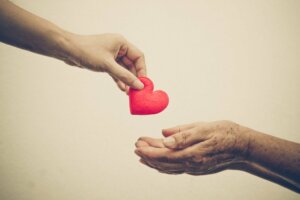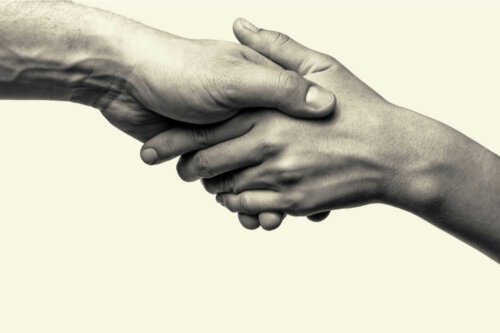Prosocial Behaviors: Do You Help Others Out of Empathy or Anxiety?

Carrying out prosocial behaviors (helping a family member, a friend, or a stranger on the street) can make you feel altruistic and kind. Giving a hand to a person in need can make you believe that you’re a good person with high values and morals. Similarly, it’s common to feel selfish when you refuse to help. However, have you ever stopped to think that perhaps this helping behavior isn’t exactly a selfless act?
Have you ever stopped to think about the hidden motivations behind your desire to help and be generous with others? Are you sure that it’s always due to emotions of understanding and empathy? What if the desire to contribute to another person’s well-being isn’t the reason for your solidarity? Certain investigations that explored these approaches reached interesting conclusions.
Do you help out of empathy or anxiety?
For decades, researchers have been studying human prosocial behaviors. Why do people help others? Is everyone born with this predisposition or is it cultural learning? Numerous authors have debated these and other questions.
Let’s see this with an example. It’s been proven that, at the brain level, if you watch another person suffering, your brain will activate the same neural networks involved in their pain processing. In a few words, it’s true that, to a certain extent, most people are capable of experiencing other people’s pain as their own. You may be one of those.

But what exactly do you feel in such situations? The hypothesis that seems to have the most empirical support is the one that states that you can react in two different ways when you see someone in need.
- Firstly, you can react with anguish, disgust, concern, or horror.
- On the other hand, you can experience compassion and understanding. You can feel genuinely moved.
Now, depending on various factors, one feeling will rise above the other. Firstly, it’ll depend on the concrete context of the individual’s suffering. Secondly, on the personal disposition of whoever observes it. Faced with the same event, people can have different reactions. Even so, the same individual might react differently to two separate situations.
What’s your motivation?
Whether the situation causes anguish or compassion in you, you’re probably more than likely to help someone in need. However, your motivation in each case can be different.
Basically, people tend to have a selfish pattern of action when they experience alarm, disgust, or worry. In other words, they help others in order to relieve the discomfort that seeing them in distress caused them. On the contrary, if they feel moved, they’ll act under a truly altruistic motivation – they’ll be focused on the other person’s suffering instead of their own.
University students conducted studies that allowed them to discover this reality. In these studies, they found that the type of help pattern depended on the feelings experienced. Basically, those who felt anxious acted under the motivation to reduce it. Nonetheless, those who felt compassionate acted with the goal of reducing the need for the other.
You can’t simply choose the type of response that’ll activate in you. For that reason, it isn’t possible to affirm that one of the groups is more or less supportive than the other on a moral level. In addition, an interesting fact occurred in one of the studies. When the act of helping had a high personal cost, those who tended to feel genuine empathy showed a selfish pattern of acting. It seems that the fact that there was a personal sacrifice annulled the initial altruistic impulse.

Does everyone conduct prosocial behaviors?
These findings increase the ever-existing ambiguity regarding the question of the extent to which human beings are truly caring, altruistic, and generous. You probably already knew that, on many occasions, helping gives a feeling of gratification. However, now you know that it also helps to avoid your own discomfort as well.
As you can see, the helper’s feelings determine their course of action. So is it possible to affirm that the concern for the other person is truly what moves them? In any case, and whatever the latent motivation, prosocial behaviors are beneficial. Helping those around you will for sure increase the feeling of well-being. Also, it’s important to continue promoting these behaviors in order to create a more satisfactory social coexistence.
All cited sources were thoroughly reviewed by our team to ensure their quality, reliability, currency, and validity. The bibliography of this article was considered reliable and of academic or scientific accuracy.
- Batson, C. D., O’Quin, K., Fultz, J., Vanderplas, M., & Isen, A. M. (1983). Influence of self-reported distress and empathy on egoistic versus altruistic motivation to help. Journal of personality and social psychology, 45(3), 706.
- Batson, C. D., Fultz, J., & Schoenrade, P. A. (1987). Distress and empathy: Two qualitatively distinct vicarious emotions with different motivational consequences. Journal of personality, 55(1), 19-39.
This text is provided for informational purposes only and does not replace consultation with a professional. If in doubt, consult your specialist.








